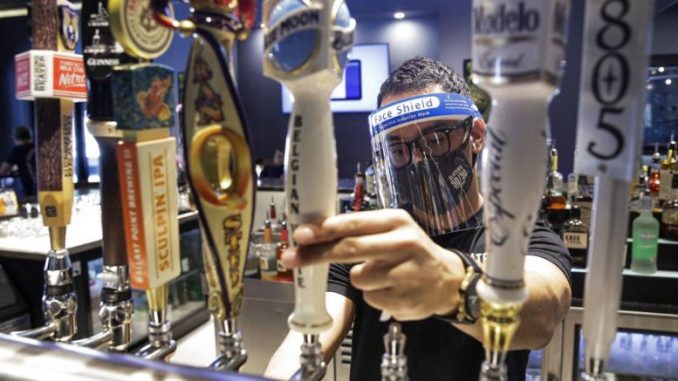

A bartender pours a beer while wearing a mask and face shield amid the coronavirus pandemic at Slater’s 50/50 Wednesday, July 1, 2020, in Santa Clarita, Calif. (AP Photo/Marcio Jose Sanchez, File)
OAN Newsroom
UPDATED 12:17 PM PT – Sunday, August 9, 2020
Bar closures and other lockdown measures meant to mitigate the spread of COVID-19 have sparked potentially permanent alcohol reforms in U.S.
The consumption of alcohol in bars is often associated with tightly packed crowds and drink sharing, which are both suspected to be major catalysts for spreading the virus. Local authorities have cracked down on this kind of activity in hopes of bringing an end to the pandemic.
However, this move has also prompted a series of reforms on how Americans can consume alcohol.
Bars, which were hardest hit by COVID closures, have been ordered to close or limit capacity.

A patron watches TV in a bar prior to NHL hockey exhibition game action betweent the Columbus Blue Jackets and the Boston Bruins in Toronto, Thursday, July 30, 2020. (Frank Gunn/The Canadian Press via AP)
Ohio Governor Mike DeWine has opted to shut down alcohol sales for dine in after 10 pm.
“We believe stopping the sales at 10 o’clock is going to help,” he said. “It will help thin that crowd out and slow the spread.”
Meanwhile, some reforms have eased restrictions on alternative forms of business to keep them afloat. For example, more than 30 states have voted to allow to-go and delivery sales of alcoholic beverages.
Although originally intended as a temporary fix, many of these reforms could endure well after the coronavirus has subsided. Lawmakers in multiple states, including Michigan and New York, have voted to maintain these changes for years after the pandemic ends to help booze based businesses recover.
Iowa has even opted to make to-go cocktails permanent, while other states like Ohio are considering doing the same.

People crowded around bars in Sturgis, S.D., on Friday, Aug. 7, 2020 during the 80th anniversary of the Sturgis Motorcyle Rally. (AP Photo/Stephen Groves)
Bar staff make up a significant portion of workers who lost their jobs as a result of the pandemic. Many people argued making these reforms last will be key to helping these businesses hire back employees and recover from the economic impact of COVID-19.






Be the first to comment